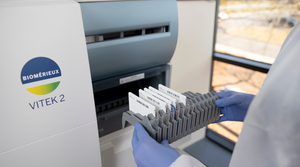Theranos Blood Testing Tech Gets a Boost from FDA Clearance
July 6, 2015
FDA clearance of a Theranos herpes simplex 1 virus test, which was not required, nevertheless adds weight to the company's claims that finger prick blood tests are the future.
|
Elizabeth Holmes, CEO of Theranos, has become a celebrity entrepreneur over the past year. |
Chris Newmarker
Theranos recently announced that it has received its first FDA clearance, involving a test and system that can detect herpes simplex 1 virus with but a drop or two of blood.
Clearance for the oral herpes test actually wasn't required. But the young company's billionaire founder and CEO Elizabeth Holmes, 31, has insisted that FDA clearance of Theranos tests is one of the best way to counter naysayers who say that Theranos has not released enough third-party data about the effectiveness of its tests and the so-far secret technology behind them. She even told the New Yorker last year that "FDA's stamp of approval is seen as an indicator of the quality of a product."
Theranos has an expanding network of testing centers in Walgreens, with locations presently in Arizona and California. The Palo Alto, CA-based company received another recent boost when Arizona passed a law allowing its residents to directly obtain and pay for lab tests. Holmes has said her goal is for Theranos to improve preventative healthcare with fast, cheap, easily accessible blood testing that only involves a finger prick, versus drawing blood into a vial or two from a vein in the arm. About 150 of Theranos' tests, including the HSV-1 test, cost less than $10.
Holmes explained in a Theranos news release last week that if Theranos is to reach its goals it must demonstrate that its lab tests meet the highest quality standards--standards that are comprehensively set by FDA.
"FDA review is a uniquely rigorous process we undertook voluntarily because we remain deeply committed to ensuring that our systems and all of our laboratory developed tests are of the highest quality, and that patients and their physicians have access to the most accurate information about their health," Holmes said.
Theranos says it won FDA 510(k) clearance for the herpes 1 test after providing study data from 818 subjects of varying age and ethnicity. The study data, according to the company, showed its system could be run accurately using only a finger stick as well as a traditional venous draw across large numbers of Theranos devices. The technology was compared against an FDA cleared, commercially available reference method.
There are plenty of experts out there, however, that would like to see data in peer-reviewed journals. Theranos has little to show when it comes to peer-reviewed studies, raising questions about its "stealth research," John P.A. Ioannidis, MD, noted in the Journal of the American Medical Association.
Ioannidis, who is chairman of disease prevention at Stanford University, tells the Washington Post that the new FDA approval is a "step in the right direction," but it is also important to "have the full information available in the scientific community through peer-reviewed publications on methods and results, with access of other scientists to the raw data and protocols."
Refresh your medical device industry knowledge at MEDevice San Diego, September 1-2, 2015. |
Chris Newmarker is senior editor of Qmed and MPMN. Follow him on Twitter at @newmarker.
Like what you're reading? Subscribe to our daily e-newsletter.
About the Author(s)
You May Also Like


